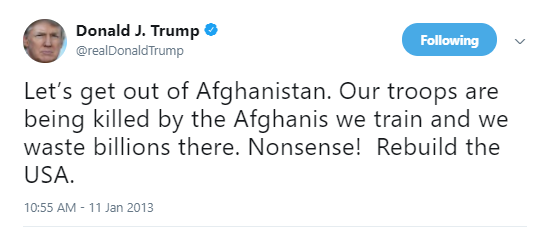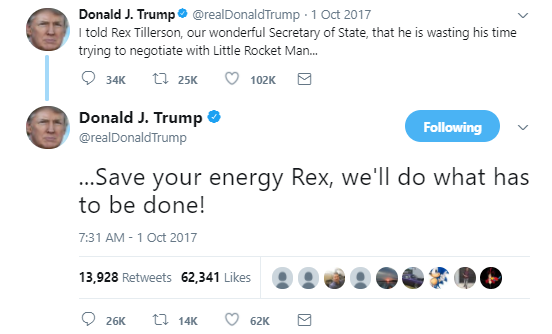Donald Trump did not assume the presidency with any major experience on issues of foreign policy — or, for that matter, domestic policy.
When confronted with foreign policy issues since taking office, Trump has responded in multiple instances by exacerbating the situation. For example, Trump’s rhetoric towards the North Koreans has given them yet another excuse to continue developing their nuclear capabilities — and the North Korean regime now claims to be fully prepared to strike the U.S. with a nuclear weapon.
Another foreign policy issue that the president has been faced with since taking office is the ongoing struggle against terrorists in Afghanistan.
Trump has, in the past, claimed to have always been against U.S. military operations in Iraq, operations that have always been closely connected to the operations carried out by the U.S. military in Afghanistan. In reality, he has at times expressed approval for “nation building” efforts such as those undertaken by the U.S. in the Middle East, and now his administration is — apparently — turning to increased military operations as an answer to the question of what to do in Afghanistan.
Besides the case of the Iraq War, Trump has also expressly criticized U.S. operations in Afghanistan, having taken to Twitter to do so back in 2013, among other instances of the same.
He wrote:
‘Let’s get out of Afghanistan. Our troops are being killed by the Afghanis we train and we waste billions there. Nonsense! Rebuild the USA.’
That overall stance is generally what the president has kept up in his public statements since taking office, but now, as the new year dawns, the Trump Administration is continuing down a path of actually increasing the size of the U.S. presence in Afghanistan, although the president has insisted that the efforts are more about fighting terrorists than about “nation building.”
This past summer, an eventual total of about 3,000 troops began being deployed to Afghanistan, in addition to the 11,000 or so already there. As time goes on, the U.S. military will be sending numerous more advisers to assist Afghan military forces.
In addition to the troop level increases, U.S. military officials have also been granted increased freedom to drop bombs on militants in Afghanistan.
In that light, in August of 2017, the military revealed that it had dropped the largest non-nuclear bomb in its possession on an ISIS target in Afghanistan.
Yet again in this instance, the Trump Administration is relying on brute force instead of diplomatic tactics. Trump has dismissed the possible significance of diplomacy in the case of the threat from North Korea’s nuclear arsenal, and we can all see where that has gotten us.
The president’s reliance on military might above diplomacy — having literally left an array of important positions in the State Department unfilled at this point — has observers worried.
Win Without War director Stephen Miles put it like this:
‘He’s putting a Donald Trump spin on the previous administration’s Afghanistan strategy, slightly fewer troops but more bombing… The question of Afghanistan in 2018 is are we going to learn of the failures of the past? We’re seeing a complete failure for having any sort of regional framework. We keep making the same mistakes and nothing really changes, unfortunately.’
While occupying himself with finding ways to put his own “spin” on overseas military operations, he continues to push a domestic policy agenda that leaves the average American behind.
Featured Image via Andrew Harrer/Bloomberg via Getty Images















